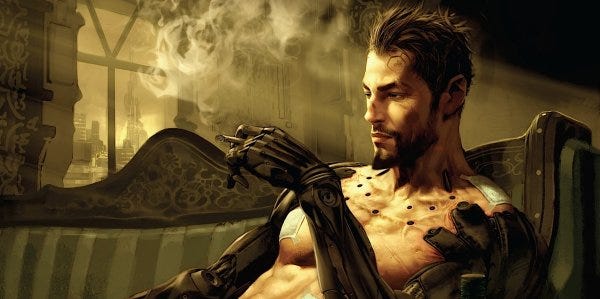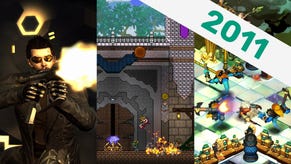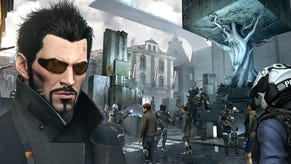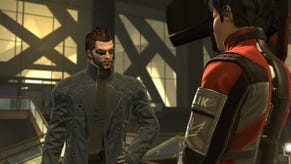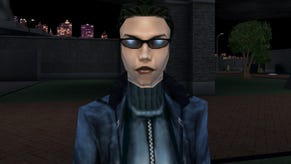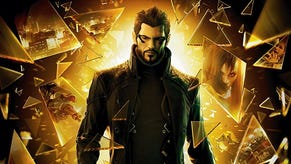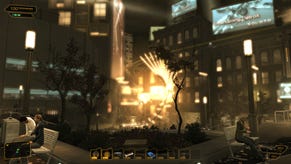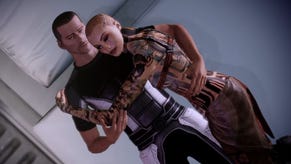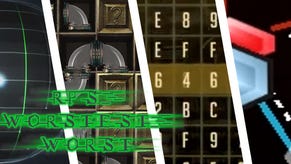DXHR Interview: Boss Fights, Endings, DLC
Jean-François Dugas interview
Yesterday I had a chance to catch up with Deus Ex: Human Revolution lead, Jean-François Dugas, and to chat about the state of things now that the game has been released. Read on for what he had to say about the "disappointment" of the boss battles, the way in which the ending of the game did not match the original plan, and the delight the team felt in having managed to create this formidable game as their first project.
RPS: How were you guys feeling about the game once it had shipped?
Dugas: People were relieved, happy. People are excited because when you work on a game for that length of time, well, for a long time before it starts to be good, it's bad. For a long time it's bad. In the everyday work that people do they just see bits and pieces, and parts are all over the place. They don't get to see much of the big picture, and a lot of people will, in those low times, ask "is the game going to be good?" or say "I am scared about it", blahblahblah, and then seeing the game come out and the reviews and the great feedback from players, people were really pumped about it.
We built that team in 2007. We had to build the team and everything was new for us, and then we had to tackle a first project like Deus Ex. That was not a small challenge. We were feeling very, very good afterwards. It was important that our first game be able to become the flagship game for the studio, to say that we mean business and that we will make good quality games. It's a priority for us that Deus Ex becomes our business card.

RPS: So you didn't look back and think: "well, we could have done THAT differently"?
Dugas: Well it's always easy to look back and say "ok, we could have done this or that differently", or "why did we do that!" but when you are in the midst of actually making things happen it's not always so easy to see things clearly. The big disappointment was with the boss fights, because we weren't able to bring them to the level quality that we had in mind. That is my disappointment, but in the reality of the past few years, and all the other things we have had to contend with, I think it would have been hard to have the bosses otherwise.
RPS: Why do you think the boss battles didn't work?
Dugas: When we started the goal was to have those boss fights with the same design and rules as the rest of the game. We had our pillars of stealth, of non-lethal actions, and everything else, and we wanted to make sure that was reflected in the bosses, but in the end it was not. It's the place where people were surprised because they would equip themselves in a certain way and then they got their and everything they'd fought for disappeared. You have to change your mindset, which can be upsetting. I think the biggest weakness there wasn't the concept of having boss fights, it's just that our boss fights are not Deus Ex boss fights and that's why people are complaining about them. I guess we live and learn.
Should we have cut them? It's a decision we made, we said "well at least they will be entertaining in some fashion". The biggest surprise, actually, was having released the game and finding that people thought they were frustrating. Not just that they weren't that interesting, but that they were frustrating. The playtesters internally gave us a lot of good feedback for the game, and on the bosses they felt that the fights were entertaining and making you use what you had learned. They didn't say they were frustrating. We knew it was not in step with the rest of the game, but the surprise for us was that the playtesting was correct everywhere but the bossfights. So lesson learned.
RPS: I think what surprised me most about playing the game, actually, was how much it felt like a Deus Ex game. It felt like the original, but it also had elements of Invisible War in there. You seemed to take the base getting blown up at the start structure from IW, but also much of the narrative and character structure from the original, with characters filling very similar roles. Was that level of mirroring the previous games intentional? Were you trying to hit the same beats as those games?
Dugas: For us it was really important to stay faithful to the spirit of the original games. We didn't try to recreate those games, we just wanted to recapture the feel you get when you discover that kind of game. Ten years ago, when you discovered that, it was fascinating - we wanted to recreate that feeling for a new generation of gamers who are not familiar with that game, we thought that giving that kind of vibe was really cool. And for the old timers, they would feel at home. We managed to keep the spirit alive. It was a conscious effort, and we succeeded because we worked hard, but I cannot tell you the specific reason why it is like Deus Ex. We did the best we could and we managed it. We could have worked really hard and missed the point, but we got there, and it was a conscious decision.
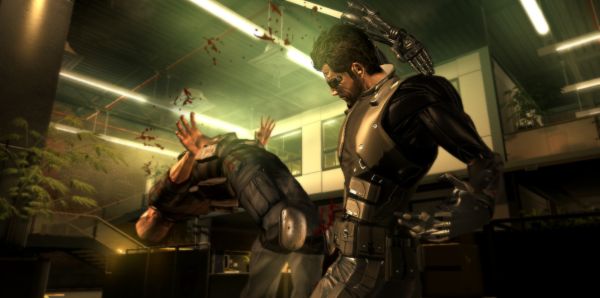
RPS: So you can't say what was the toughest thing about making it a recognisably Deus Ex?
Dugas: The toughest thing... You have to keep the mindset all the time, of what you are offering to the player. All the time. You have to stay ahead of them. It was all about combining the story with the levels and all the ramifications and trying to comprehend all those things and make them work.
Initially it was also very tough to convince the team to be totally on board, because you would have to go to them and say things like "ok, you have to work on this piece for the next two months, and and only 30% of players are going to see that". Most games have the philosophy of "if we spend money and time on something, all players must see that" and so that is a challenge aspect. There are hidden paths where you might see something if you go left, but miss what is on the right, and so on. Working with that philosophy in mind was hard at first, but when you start to play the game and see that everyone has a different experience within the same experience, well, you start to understand the richness of that. The team now really understand that aspect and they want to go and do more and more and more! And we don't have the argument about whether the player should see what you built.
RPS: So was there much you had to cut then? Or did that philosophy mean you left more in?
Dugas: When you look at the features we came up with four years ago, we had roughly 1000 features that we wanted to put into the game. And I'm not kidding. We managed to get about 90% of that in. Everything that was critical to the game is in the game. All the things we cut were an added layer on something else, but none of it was critical to making the game what it is. There were some augmentations that did not make the final game, but you don't know about them, you don't miss them. Also, actually, I wanted working ATMs in the game, and we did not have those, but you still have a good hacking experience. There were some details we couldn't fit into the game, but the bulk and what makes the experience the way it is was on the design sheet and we managed to implement them.

RPS: Did the PC version throw up any problems?
Dugas: No. Because when we started we knew we were to go cross platform, but I said "fine, but the PC version cannot just be a console port". It had to feel like a PC version, and the console versions the same. They had to feel like a console version. It is the same story, the same gameplay, the same world, but the feel with the UI and everything else in the interface has to be adapted to the platform. It was fundamental to us. We always had the PC version of the document ready where it matters. We worked very closely with Nixes in terms of our collaboration with them, we explained what we wanted and they were totally on board. Everything you see in every version of the game was coming from the same design team, so really it presented no special problem.
RPS: The transhumanist theme - can you tell me a bit about why you chose that rather than the other rather more insane conspiracy theory stuff that the Deus Ex world had available to it? Did you know when you were designing the mechanical aspects of the that this was what you wanted to deal with?
Dugas: So at the start we asked "what is Deus Ex?" And it is about conspiracy, it is about a lot of current themes about what is happening in the world, but moreover it is about a character who has something added to him, something inside him, technology, that makes him better at what he does. That's the heart of the experience of transhumanism. Whether it is biomechanical or nanotechnology, it is all about improving our bodies. In 2007, when we started the game, these issues were already important. We were seeing a lot of research about improving ourselves, whether to replace a limb, or to replace lost eyes with a camera connected to the brain. We thought: this is what is at the heart of the game, this should be the central theme of the story, too. Since we were rebooting we needed to almost treat it as a new IP, and to have this as a conversation with the player, "what is the theme of Deus Ex?" It is this: Transhumanism. And that is about what it means to be human, where we think we should go as a race, what is right and wrong, where are the limitations. This is reflected in everything in Deus Ex: in the story, in the theme, it was obvious from very early on that this was what we had to do.

RPS: It was interesting to see how different people dealt with those themes in the ending they chose. And speaking of the ending, that was something else that drew a lot of criticism. How do you feel about the criticism of what you did there - four buttons in a room, rather than different scenes, different RPG style endings, perhaps?
Dugas: There are two aspects to the ending. The first aspect has to do with the buttons. In the original design we did not want it to just be you facing four buttons and you just press one, end of story. We wanted the players to get involved in doing something more that would make the choice mean more in their minds, but again it was just a constraint of production at some point. We simplified the ending to make sure that we could do it, that we could ship it. Just on that basis I can understand why players were disappointed to be faced with a four-button choice. Of course the endings are influenced by what you have done in the game, and then you get to the videos. For this part, the ending videos, I am totally happy with how that worked. That was the vision we had, and we fulfilled it. When I look at the endings and the feedback, it's not unanimous that people hate them. Some players love them, other players feel disappointed because they just think "what happened next?" As an editorial decision it was the right decision, but I respect that some people did not feel good about the end, or did not get them.
RPS: How much do you think DXHR brings back the idea of the "immersive sim", following on from what Looking Glass did? Is this what you want to push in the future? Is this what Eidos Montreal is going to be about in the future?
Dugas: We always want it to feel like a game, but we try to bring different layers to the experience. They are entertainment, but also give you scope to be creative. Whether all the games from the studio are going to be like that... I cannot answer that. This is what the Deus Ex team are interested in, but not as about being a simulation, but being immersive and giving the player some tools to be creative in the world. Visually, if we were more simulation, the game would be quite different. The price of the visual clutter in our world is not being able to interact with everything. One thing we do not want to compromise is the player's feeling that they can creative in the game world, but at the same time it is not at the expense of an immersive world. Basically what matters is a great player experience, and we will do whatever it takes to get there.
RPS: How much was Metal Gear Solid an influence on the game?
Dugas: It had some influence in terms of creating characters, characters with motivation and charisma. That was an influence. We also looked a bit at how they managed their stealth and such, but I would say it actually was more of a high level artistic influence than a "let's be more like Metal Gear Solid". I would say that some aspect of the gameplay, like the cone of vision and the radar... that is something you would also experience with the Metal Solid games, and that had some sort of influence on us, but it's more spiritual than actually related to gameplay mechanics.

RPS: What can you tell us about the forthcoming DLC?
Dugas: The DLC is coming in October. It's going to expand on Adam Jensen's story within the story of Human Revolution. It explains a part of the conspiracy. We are getting better with the engine, so we were able to improve the lighting system and the so the DLC looks quite a bit better than the full game! We also have a boss encounter which is more in line with what we were trying to achieve in the first place, so hopefully we will get some good feedback from that. There's a lot of new content in there, and it keeps the pillars of the main game. I don't want to talk too much about the story, but it happens after the explosion in Hengsha, and you are aboard a boat going to Singapore, and it explains a bit about what happens during those few days.
RPS: Should we expect another Deus Ex game from your studio?
Dugas: I don't know. I wish were able to do another one. I hope we are going to make another one. But that's pretty much it for now.
RPS: Thanks for your time.
